Its individual members, slumped
in the grass, and staggering as if shot down, have hardly found the strength to arrive
and drop on this tiny battlefield: how they sleep, these bodies, on the dull sod!
So I am going to marvel and muse freely.
No, my gaze cannot escape toward the horizon from the window where I am leaning, without
some part of me inappropriately overstepping those scattered plague victims, which
would show a lack of courtesy and propriety in my turn; from my own standpoint, I
must appreciate their mysteriousness and assess their task: for bread was pain ne lui a pas suffi—ils ont peiné une partie notable de la semaine, pour l’obtenir,
d’abord; et, maintenant, la voici, demain, ils ne savent pas, rampent par le vague
et piochent sans mouvement—qui fait en son sort, un trou égal à celui creusé, jusqu’ici,
tous les jours, dans la réalité des terrains (fondation, certes, de temple). Ils réservent,
honorablement, sans témoigner de ce que c’est ni que s’éclaire cette fête, la part
du sacré dans l’existence, par un arrêt, l’attente et le momentané suicide. La connaissance
qui resplendirait—d’un orgueil inclus à l’ouvrage journalier, résister, simplement
et se montrer debout—alentour magnifiée par une colonnade de futaie; quelque instinct
la chercha dans un nombre considérable, pour les déjeter ainsi, de petits verres et
ils en sont, avec l’absolu d’un accomplissement rituel, moins officiants que victimes,
à figurer, au soir, l’hébétement de tâches si l’observance relève de la fatalité plus
que d’un vouloir.
Les constellations s’initient à briller: comme je voudrais que parmi l’obscurité qui
court sur l’aveugle troupeau, aussi des points de clarté, telle pensée tout à l’heure,
se fixassent, malgré ces yeux scellés ne les distinguant pas—pour le fait, pour l’exactitude,
pour qu’il soit dit. Je penserai, donc, uniquement, à eux, les importuns, qui me ferment,
par leur abandon, le lointain vespéral; plus que, naguères, par leur tumulte. Ces
artisans de tâches élémentaires, il m’est loisible, les veillant, à côté d’un fleuve
limpide continu, d’y regarder le peuple—une intelligence robuste de la condition humaine
leur courbe l’échine journellement pour tirer, sans l’intermédiaire du blé, le miracle
de vie qui assure la présence: d’autres ont fait les défrichements passés et des aqueducs
ou livreront un terre-plein à telle machine, les mêmes, Louis-Pierre, Martin, Poitou
et le Normand, quand ils ne dorment pas, ainsi s’invoquent-ils selon les mères ou
la province; mais plutôt des naissances sombrèrent en l’anonymat et l’immense sommeil
l’ou’ïe à la génératrice, les prostrant, cette fois, subit un accablement et un élargissement
de tous les siècles et, autant cela possible—réduite aux proportions sociales, d’éternité.
not enough for them (unlike the majority and more fortunate ones)—first they worked
for a substantial part of the week to gain it; and now here they are, with no knowledge
of tomorrow, crawling through the haze and digging motionlessly—making as big a hole
in their destiny as the one they have dug daily till now in the reality of the ground
(a foundation for a temple, assuredly). By stopping, waiting, and momentarily committing
suicide, they honourably retain the sacred part of existence, without witnessing what
it is or what lightning-bolts this festal occasion is shedding. The knowledge that
would become resplendent—of a certain pride in their daily work, simply to resist
and stand tall—is magnified on all sides by a colonnade of trees; some instinct sought
that knowledge in a large number of drinks, to contort them in this way, and at dusk,
victims rather than officers, with the absoluteness of a ritual consummation, they
have reached the point of representing the stupefaction of tasks when they are imposed
by necessity instead of some desire.
The constellations are starting to shine: how I would wish that points of light, a
certain recent thought, should also be fixed in the darkness that falls over the blind
herd, in spite of the fact that their sealed eyes cannot discern them—for the sake
of fact and exactness, so that it may be said. Thus I shall think only of them, the
intruders, who are shutting out the distant twilight from me, more effectively by
their current surrender than by their previous hubbub. As I watch over them alongside
a limpid unwavering river, I may see these artisans of elementary tasks as the people—a
healthy understanding of the human condition is daily bending their backs in order
to draw forth, without the intermediary of wheat, the miracle of life that assures
presence: others have cleared the land completely and erected aqueducts, or will subject
a strip of soil to a certain machine, the same people, Louis-Pierre, Martin, Poitou,
and the Norman, as they call each other when awake according to their mother or their
homeland; instead, however, births have sunk into anonymity, and at the moment, with
their ear to mother earth, they sleep an immense sleep that exhausts them, undergoing
a prostration and an extension of all the ages and also, as far as such a thing is
possible—when reduced to social proportions, of eternity.
Poème
Un coup de dés jamais n’abolira le hasard
[French text on pages 139–159]
Poem
A Dice Throw At Any Time Never Will Abolish Chance
[English text on pages 161–181]
UN COUP DE DÉS
JAMAIS
QUAND BIEN MÊME LANCÉ DANS DES CIRCONSTANCES
ÉTERNELLES
DU FOND D’UN NAUFRAGE
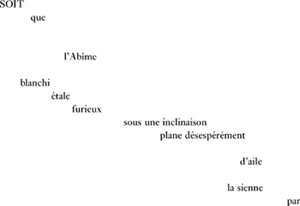
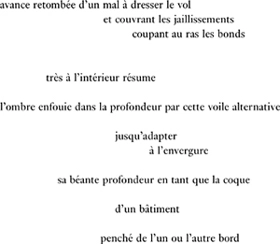
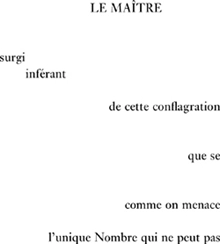
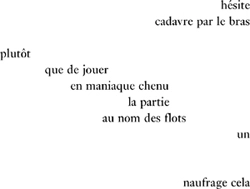
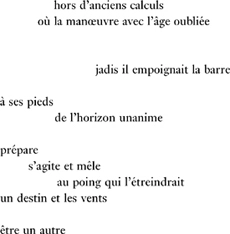

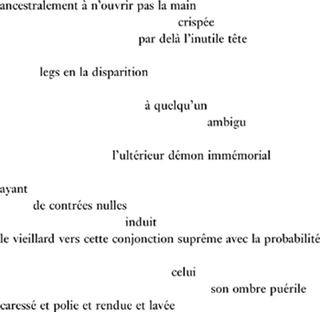
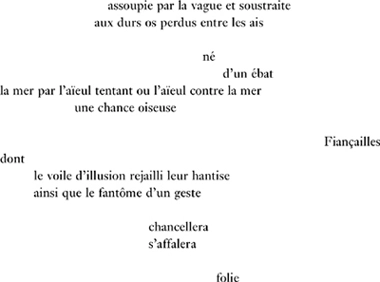
N’ABOLIRA
COMME SI
Une insinuation
au silence
dans quelque proche
voltige
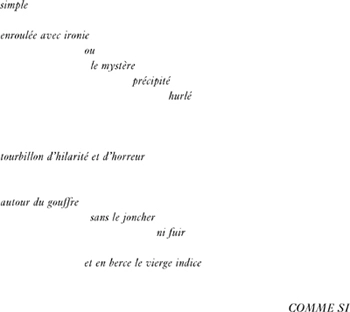
plume solitaire éperdue
sauf
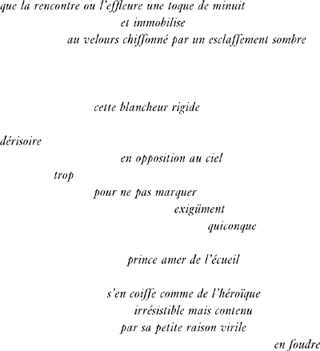

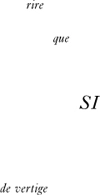
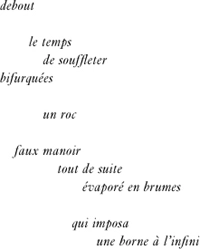
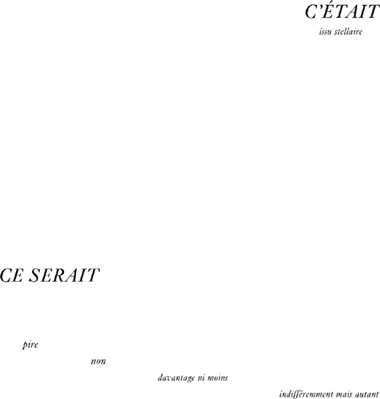

LE HASARD
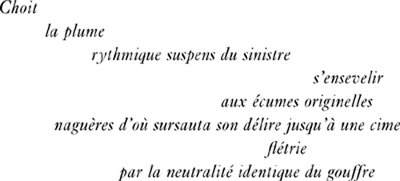
RIEN
de la mémorable crise
ou se fût
l’événement
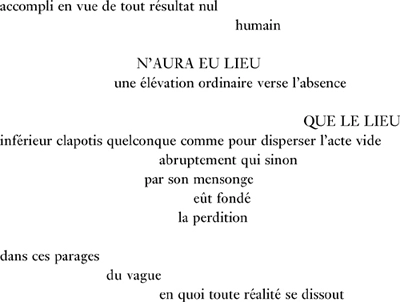

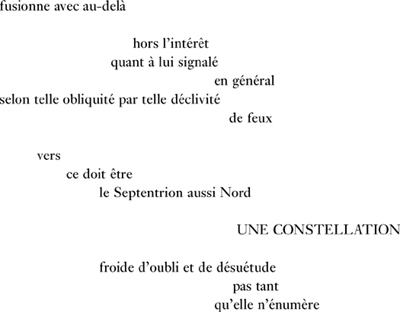
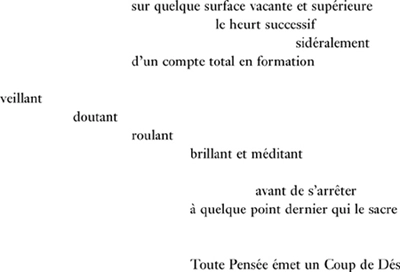
A DICE THROW
AT ANY TIME
EVEN WHEN CAST IN
EVERLASTING CIRCUMSTANCES
FROM THE DEPTH OF A SHIPWRECK
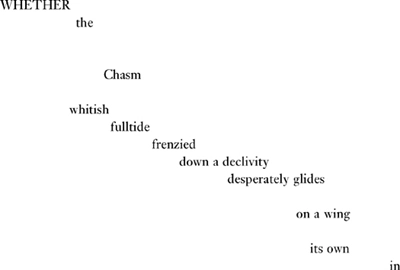

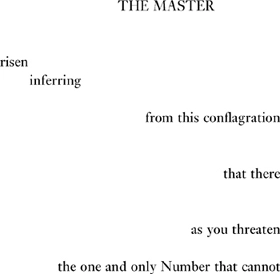
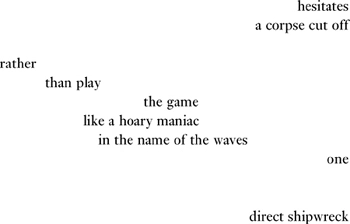


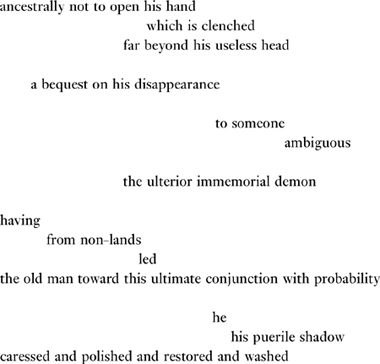
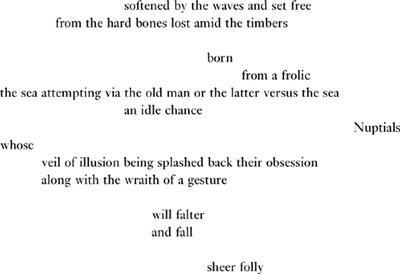
NEVER WILL ABOLISH
AS IF
A simple
in the silence
in some imminent
hovers
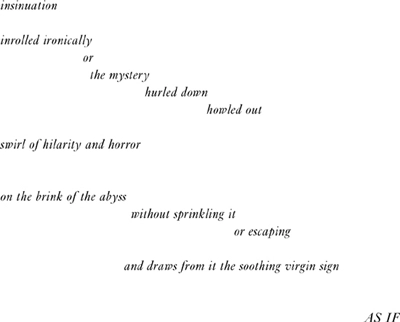
an utterly lost and lonely quill
except
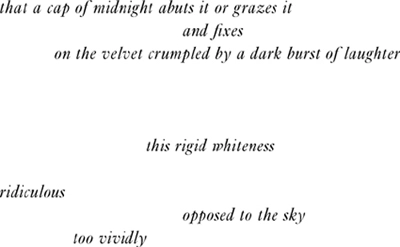
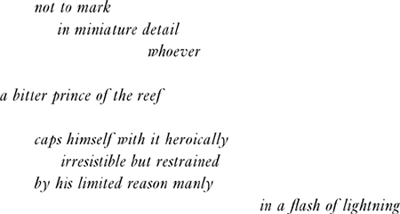

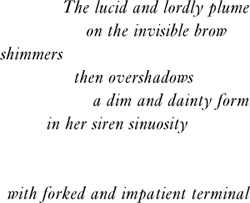
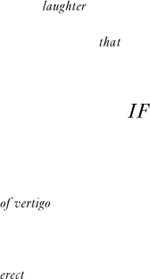
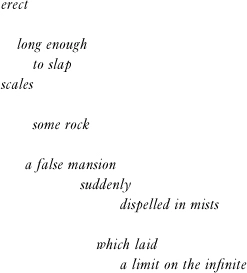

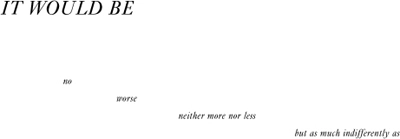
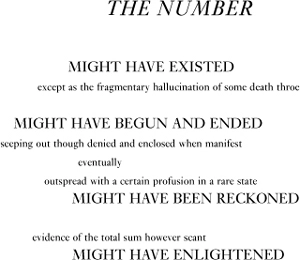

NOTHING
of the unforgettable crisis
or else
the deed
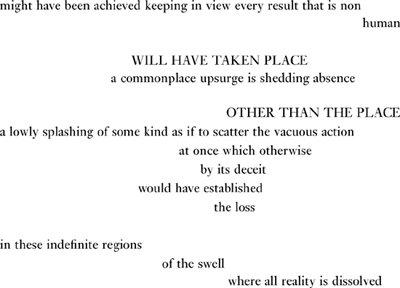

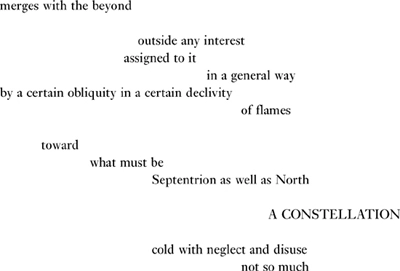
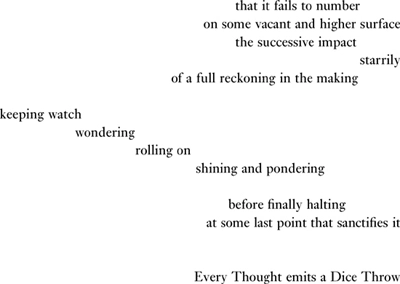
APPENDIX I
Poems Uncollected by Mallarmé
Soleil d’hiver
A Monsieur Éliacim Jourdain
Phébus à la perruque rousse
De qui les lames de vermeil,
O faunes ivres dans la mousse,
Provoquaient votre lourd sommeil.
Le bretteur aux fières tournures
Dont le brocart était d’ors fins,
Et qui par ses égratignures
Saignait la pourpre des raisins.
Ce n’est plus qu’un Guritan chauve
Qui, dans son ciel froid verrouillé,
Le long de sa culotte mauve
Laisse battre un rayon rouillé:
Son aiguillette, sans bouffette,
Triste, pend aux sapins givrés,
Et la neige qui tombe est faite
De tous ses cartels déchirés!
L’Enfant prodigue
I
Chez celles dont l’amour est une orange sèche
Qui garde un vieux parfum sans le nectar vermeil,
J’ai cherché l’Infini qui fait que l’homme pèche,
Et n’ai trouvé qu’un Gouffre ennemi du sommeil.
Winter Sun
For Monsieur Éliacim Jourdain
Red-wigged Apollo
whose scarlet swordblades
used to prod the deep slumbers
of fauns drunk in the moss.
The brigand in bold garb
5
brocaded with fine gold
who slashed the grapes
till they bled purple.
Now merely a bald old Guritan
in his cold and bolted sky,
10
letting a rusty sunbeam
slap against his mauve breeches.
His aglet with no rosette
dangles sadly in the frosted firs,
and the falling snow is composed
15
of all his shredded challenges!
The Prodigal Son
I
Among the girls whose love is oranges’ dried skin
with no nectar despite the old scents they still keep,
I sought the Boundless that impels mankind to sin
and found only a Chasm inimical to sleep.—
—L’Infini, rêve fier qui berce dans sa houle
Les astres et les cœurs ainsi qu’un sable fin!
—Un Gouffre, hérissé d’âpres ronces, où roule
Un fétide torrent de fard mêlé de vin!
II
O la mystique, ô la sanglante, ô l’amoureuse
Folle d’odeurs de cierge et d’encens, qui ne sus
Quel Démon te tordait le soir où, douloureuse,
Tu léchas un tableau du saint-cœur de Jésus,
Tes genoux qu’ont durcis les oraisons rêveuses,
Je les baise, et tes pieds qui calmeraient la mer;
Je veux plonger ma tête en tes cuisses nerveuses
Et pleurer mon erreur sous ton cilice amer;
Là, ma sainte, enivré de parfums extatiques,
Dans l’oubli du noir Gouffre et de l’Infini cher,
Après avoir chanté tout bas de longs cantiques
J’endormirai mon mal sur votre fraîche chair.
… Mysticis umbraculis
(Prose des Fous)
Elle dormait: son doigt tremblait, sans améthyste
Et nu, sous sa chemise: après un soupir triste,
Il s’arrêta, levant au nombril la batiste.
Et son ventre sembla de la neige où serait,
Cependant qu’un rayon redore la forêt,
Tombé le nid moussu d’un gai chardonneret.
The Boundless, that proud dream lulling all stars and souls
5
like tiny grains of sand within its surging brine!
A Chasm bristling with sharp thistles, through which rolls
a foetid torrent of commingled rouge and wine!
II
O woman, lacerated, mystic, amorous too,
with the madness that censer and candlestick impart,
10
not knowing what Demon wrung you in the dark when you
dolefully licked a picture of Christ’s sacred heart,
I kiss your knees that self-communing prayers chastize,
I kiss your feet that would appease the open sea;
I wish to plunge my head between your vital thighs
15
and in your hair-shirt weep for my iniquity;
there, my dear saint, in that oblivion of the dim
Chasm and the Boundless, rapt with scents vibrant and fresh,
when I have finished softly chanting my long hymn,
I shall assuage my torment on your wholesome flesh.
20
… In the Mystical Shadows
(Liturgy for the Feast of Fools)
She was asleep; her bare and jewelless finger, placed
beneath her nightgown, quivered; after a deep sigh
it grew still, hitching up the cambric to her waist.
And her belly seemed like a snowdrift where,
while a gold sunbeam lit its forest lair,
5
the mossy nest of some bright finch might lie.
Sonnet
A Emmanuel des Essarts
Souvent la vision du Poète me frappe:
Ange à cuirasse fauve, il a pour volupté
L’éclair du glaive, ou, blanc songeur, il a la chape,
La mitre byzantine et le bâton sculpté.
Dante, au laurier amer, dans un linceul se drape,
Un linceul fait de nuit et de sérénité:
Anacréon, tout nu, rit et baise une grappe
Sans songer que la vigne a des feuilles, l’été.
Pailletés d’astres, fous d’azur, les grands bohèmes,
Dans les éclairs vermeils de leur gai tambourin,
Passent, fantastiquement coiffés de romarin.
Mais j’aime peu voir, Muse, ô reine des poèmes
Dont la toison nimbée a l’air d’un ostensoir,
Un poète qui polke avec un habit noir.
Haine du pauvre
Ta guenille nocturne étalant par ses trous
Les rousseurs de tes poils et de ta peau, je l’aime
Vieux spectre, et c’est pourquoi je te jette vingt sous.
Ton front servile et bas n’a pas la fierté blême:
Tu comprends que le pauvre est le frère du chien
Et ne vas pas drapant ta lésine en poème.
Comme un chacal sortant de sa pierre, ô chrétien
Tu rampes à plat ventre après qui te bafoue.
Vieux, combien par grimace? et par larme, combien?
Mets à nu ta vieillesse et que la gueuse joue,
Lèche, et de mes vingt sous chatouille la vertu.
A bas! …—les deux genoux! …—la barbe dans la boue!
Sonnet
For Emmanuel des Essarts
Often the Poet catches my gaze:
an angel in a fulvid breastplate, who delights
in the sword’s flashing rays; or else, bright dreamer, displays
the mitre, ornamental staff, and cope of Byzantine rites.
Dante wears bitter laurels and funereal drapes
5
where night and serenity entwine;
Anacreon laughs, stark naked, and kisses a cluster of grapes,
heedless of summer’s leaves on the vine.
Amid the scarlet flashes of their gay tambourine
all the great Bohemians, fantastically decked in rosemary,
10
pass by, spangled with stars, maddened with the Absolute.
But I scarcely care to behold, O Muse, poetry’s queen
with radiant hair like an ostensory,
a poet who polkas in a black suit.
Hatred of the Poor
Those midnight rags of yours, with holes exposing
your freckles and red bristles—I love them all:
so I am tossing you twenty sous, old phantom.
Your brow is servile, base, with no wan pride;
you, knowing paupers are dogs’ brothers, never
5
dress up your stinginess in poetry.
Like a jackal leaving its lair, dear Christian,
you grovel after those who mock at you.
What price a tear, old man? what price a grimace?
Bare your senility; let it swindle, coax,
10
wheedle the virtue that my twenty sous have.
Down!—on your knees!—with your beard in the mire!
Que veut cette médaille idiote, ris-tu?
L’argent brille, le cuivre un jour se vert-de-grise,
Et je suis peu dévot et je suis fort têtu,
Choisis.—Jetée? alors, voici ma pièce prise.
Serre-la dans tes doigts et pense que tu l’as
Parce que j’en tiens trop, ou par simple méprise.
—C’est le prix, si tu n’as pas peur, d’un coutelas.
[« Parce que de la viande … »]
Parce que de la viande était à point rôtie,
Parce que le journal détaillait un viol,
Parce que sur sa gorge ignoble et mal bâtie
La servante oublia de boutonner son col,
Parce que d’un lit, grand comme une sacristie,
Il voit, sur la pendule, un couple antique et fol,
Ou qu’il n’a pas sommeil, et que, sans modestie,
Sa jambe sous les draps frôle une jambe au vol,
Un niais met sous lui sa femme froide et sèche,
Contre ce bonnet blanc frotte son casque-à-mèche
Et travaille en soufflant inexorablement:
Et de ce qu’une nuit, sans rage et sans tempête,
Ces deux êtres se sont accouplés en dormant,
O Shakspeare et toi, Dante, il peut naître un poëte!
Le Château de l’espérance
Ta pâle chevelure ondoie
Parmi les parfums de ta peau
Comme folâtre un blanc drapeau
Dont la soie au soleil blondoie.
Why that silly old coin, you scoff? The money
is glittering, some day it must verdigris,
I am scarcely devout and very stubborn,
15
make your choice.—Flung? my cash is captured, then!
Clutch it tight, tell yourself you have it only
out of scorn—or because I own too much.
It will—if you’re not afraid—buy you a cutlass.
[‘Because a bit of roast was done to a turn…’]
Because a bit of roast was done to a turn,
because the paper reported a rape,
because the maid had forgotten to button her blouse
over her tawdry and ill-shaped breasts,
because on the clock he could see a naughty old couple
5
from a bed as big as a vestry,
or because he lay awake with his leg
shamelessly brushing another leg beneath the sheets,
some simpleton plants his cold dry wife underneath him,
rubs his tasselled crown against her white cap
10
and toils inexorably, puffing and panting:
and because those two creatures coupled in their sleep
one night with no storm and no bluster,
O Shakespeare, and ah Dante, a poet may be born!
The Castle of Hope
Your fair hair is fluttering
across the scents of your skin
like a white flag frolicking
as its silk glints yellow in the sunlight.
Las de battre dans les sanglots
L’air d’un tambour que l’eau défonce,
Mon cœur à son passé renonce
Et, déroulant ta tresse en flots,
Marche à l’assaut, monte,—ou roule ivre
Par des marais de sang, afin
De planter ce drapeau d’or fin
Sur un sombre château de cuivre
—Où, larmoyant de nonchaloir,
L’Espérance rebrousse et lisse
Sans qu’un astre pâle jaillisse
La Nuit noire comme un chat noir.
[« Une négresse par le démon secouée … »]
Une négresse par le démon secouée
Veut goûter une enfant triste de fruits nouveaux
Et criminels aussi sous leur robe trouée,
Cette goinfre s’apprête à de rusés travaux:
A son ventre compare heureuses deux tétines
Et, si haut que la main ne le saura saisir,
Elle darde le choc obscur de ses bottines
Ainsi que quelque langue inhabile au plaisir.
Contre la nudité peureuse de gazelle
Qui tremble, sur le dos tel un fol éléphant
Renversée elle attend et s’admire avec zèle,
En riant de ses dents naïves à l’enfant;
Et, dans ses jambes où la victime se couche,
Levant une peau noire ouverte sous le crin,
Avance le palais de cette étrange bouche
Pâle et rose comme un coquillage marin.
My heart wearies of beating a ditty
5
in tears on a drum that has burst with such fluid,
renounces its past
and, unfurling your tresses in waves,
marches off and mounts an attack, scales the heights—
or else rolls drunkenly over marshes of blood,
10
to plant that banner of finest gold
on a dark-hued copper castle—
where Hope, listlessly weeping,
rubs up and smooths down
Night black as a black cat
15
without one pallid star gleaming.
[‘A negress aroused by the devil…’]
A negress aroused by the devil is longing
to taste a young girl saddened by strange
forbidden fruits under their tattered dress,
and is toiling, the glutton, at cunning little schemes:
on her belly she compares a pair of sprightly nipples
5
and thrusts the dark shock from between her booted legs,
like some tongue inexpert at pleasure,
so high up that no hand could reach it.
Against the quivering gazelle’s timid nudity
as she lies upturned on her back like a frenzied elephant
10
she waits and admires herself eagerly,
smiling with innocent teeth at the girl;
and between her legs where the victim is bedded,
arching her black skin parted beneath its fleece,
she pushes out the palate of that alien mouth
15
as rosy and pale as a seashell.
Hérodiade
Ouverture
LA NOURRICE
(INCANTATION)
Abolie, et son aile affreuse dans les larmes
Du bassin, aboli, qui mire les alarmes,
De l’or nu fustigeant l’espace cramoisi,
Une Aurore a, plumage héraldique, choisi
Notre tour cinéraire et sacrificatrice,
Lourde tombe qu’a fuie un bel oiseau, caprice
Solitaire d’aurore au vain plumage noir …
Ah! des pays déchus et tristes le manoir!
Pas de clapotement! L’eau morne se résigne,
Que ne visite plus la plume ni le cygne
Inoubliable: l’eau reflète l’abandon
De l’automne éteignant en elle son brandon:
Du cygne quand parmi le pâle mausolée
Ou la plume plongea la tête, désolée
Par le diamant pur de quelque étoile, mais
Antérieure, qui ne scintilla jamais.
Crime! bûcher! aurore ancienne! supplice!
Pourpre d’un ciel! Étang de la pourpre complice!
Et sur les incarnats, grand ouvert, ce vitrail.
La chambre, singulière en un cadre, attirail
De siècles belliqueux, orfèvrerie éteinte,
A le neigeux jadis pour ancienne teinte,
Et la tapisserie, au lustre nacré, plis
Inutiles avec les yeux ensevelis
De sibylles, offrant leur ongle vieil aux Mages.
Une d’elles, avec un passé de ramages
Sur sa robe blanchie en l’ivoire fermé
Au ciel d’oiseaux parmi l’argent noir parsemé,
Semble, de vols partis costumée et fantôme,
Un arôme qui porte, ô roses! un arôme,
Herodias
Overture
THE NURSE
UTTERS AN INCANTATION:
Abolished, and her dread wing in the tears
of the abolished pool reflecting fears,
lashing the crimson space of naked gold,
a Dawn has, with heraldic plumage, chosen
our cinerary sacrificial tower,
5
a leaden tomb shunned by a lovely bird—
dawn’s lone caprice in dark vain plumage … O
this mansion of degenerate dismal country!
No lapping waves! The drab water, no longer
visited by a feather or unforgettable swan,
10
is calm: the water mirrors the dejection
of autumn leaves quenching their flames in it,
of the swan when it plunged its head into
its pallid tomb or feathers, devastated
by the pure diamond of some star, although
15
it was an earlier one, and never glittered.
Crime! funeral pyre! ancient sunrise! torment!
Purple sky! Pool, accomplice of that purple!
Wide open, over the rose hues, this stained-glass window.
The curious room within a frame—the pomp of
20
a warlike era, all the goldwork tarnished—
used to be tinged with snowy yesteryear;
its lustrous pearly tapestries are useless
folds with the buried eyes of Sibyls offering
their aged fingernails toward the Magi.
25
One of them, with a woven past of flowers
on her gown bleached in a locked ivory chest
and with a bird-strewn sky on the black silver,
ghostly and garbed in risen flights, seems an
aroma carrying, O roses! an aroma,
30
Loin du lit vide qu’un cierge soufflé cachait,
Un arôme d’os froids rôdant sur le sachet,
Une touffe de fleurs parjures à la lune,
(A la cire expirée, encor! s’effeuille l’une,)
De qui le long regret et les tiges de qui
Trempent en un seul verre à l’éclat alangui…
Une Aurore traînait ses ailes dans les larmes!
Ombre magicienne aux symboliques charmes!
Une voix, du passé longue évocation,
Est-ce la mienne prête à l’incantation?
Encore dans les plis jaunes de la pensée
Traînant, antique, ainsi qu’une toile encensée
Sur un confus amas d’ostensoirs refroidis,
Par les trous anciens et par les plis roidis
Percés selon le rythme et les dentelles pures
Du suaire laissant par ses belles guipures
Désespéré monter le vieil éclat voilé
S’élève, (ô quel lointain en ces appels celé!)
Le vieil éclat voilé du vermeil insolite,
De la voix languissant, nulle, sans acolyte,
Jettera-t-il son or par dernières splendeurs,
Elle, encore, l’antienne aux versets demandeurs,
A l’heure d’agonie et de luttes funèbres!
Et, force du silence et des noires ténèbres,
Tout rentre également en l’ancien passé,
Fatidique, vaincu, monotone, lassé,
Comme l’eau des bassins anciens se résigne.
Elle a chanté, parfois incohérente, signe
Lamentable!
le lit aux pages de vélin,
Tel, inutile et si claustral, n’est pas le lin!
Qui des rêves par plis n’a plus le cher grimoire,
Ni le dais sépulcral à la déserte moire,
Le parfum des cheveux endormis. L’avait-il?
Froide enfant, de garder en son plaisir subtil
Au matin grelottant de fleurs, ses promenades,
Et quand le soir méchant a coupé les grenades!
far from the void bed veiled by a spent candle, an
aroma of cold bones roaming over the sachet,
a bunch of flowers faithless to the moon
(one is still shedding petals on the dead wax);
their stalks and their prolonged regret are steeped
35
in one solitary vase with languid brilliance.
A Dawn was dragging her wings in the pool’s tears!
Sorceress shadow with symbolic charms!
A voice, a distant evocation of the past,
is it mine, is it ready to utter incantations?
40
still lingering in the yellow folds of thought,
drifting, antique, like incense-scented cloth
above a chaos of long-cold ostensories,
through all the ancient holes and stiffened folds
pierced in the rhythm and the shroud’s pure lacework
45
letting old veiled gleam, desperate, ascend
through its lovely embroideries, there shall
rise: (O what distance hidden in those calls!)
the old veiled glimmer of a strange gilt-silver,
of the voice languishing, null, lacking acolytes,
50
will it—the antiphon still for petitions—
will it scatter its gold in final splendours
in the hour of death-agony and deadly struggles!
And so, by means of silence and dark shadows,
all things alike return to the long-distant past,
55
fateful, defeated, weary, and monotonous,
like water settling in some ancient pool.
She has sung, sometimes incoherently,
a lamentable sign!
the bed with vellum pages,
which, useless and so claustral, is not linen!
60
no longer with the crumpled scrawl of dreams
nor the sepulchral canopy in desolate watered silk,
the scent of sleeping hair. Did it ever possess that?
Cold little girl, preserving as her subtle pleasure
her walks in the dawn shivering with flowers
65
and when wicked dusk slit the pomegranates!
Le croissant, oui le seul est au cadran de fer
De l’horloge, pour poids suspendant Lucifer,
Toujours blesse, toujours une nouvelle heurée,
Par la clepsydre à la goutte obscure pleurée,
Que, délaissée, elle erre, et, sur son ombre, pas
Un ange accompagnant son indicible pas!
Il ne sait pas cela, le roi qui salarie
Depuis longtemps la gorge ancienne et tarie.
Son père ne sait pas cela, ni le glacier
Farouche reflétant de ses armes l’acier,
Quand, sur un tas gisant de cadavres sans coffre
Odorant de résine, énigmatique, il offre
Ses trompettes d’argent obscur aux vieux sapins!
Reviendra-t-il un jour des pays cisalpins!
Assez tôt? car tout est présage et mauvais rêve!
A l’ongle qui parmi le vitrage s’élève
Selon le souvenir des trompettes, le vieux
Ciel brûle, et change un doigt en un cierge envieux.
Et bientôt sa rougeur de triste crépuscule
Pénétrera du corps la cire qui recule!
De crépuscule, non, mais de rouge lever,
Lever du jour dernier qui vient tout achever,
Si triste se débat, que l’on ne sait plus l’heure
La rougeur de ce temps prophétique qui pleure
Sur l’enfant, exilée en son cœur précieux
Comme un cygne cachant en sa plume ses yeux,
Comme les mit le vieux cygne en sa plume, allée,
De la plume détresse, en l’éternelle allée
De ses espoirs, pour voir les diamants élus
D’une étoile, mourante, et qui ne brille plus!
Et…
The crescent moon, yes, the sole one is on the clock’s
steel dial, with Lucifer slung as a weight,
constantly wounding, always some new hourful
wept by the dark drops of the water-clock
70
when she wanders abandoned, with not one angel over
her shadow to escort her inexpressible steps!
He knows nothing of that, the king whose pay
has so long hired those dried and aged breasts.
Her father does not know it, nor the wild
75
glacier mirroring his arms of steel,
when on some sprawling heap of corpses with no
resinous coffins, enigmatically he
offers his dim silvery trumpets to the old pines!
Will he return some day from the Cisalpine lands!
80
Soon enough? For all things are bad dreams and ill omens!
On the fingernail raised amid the stained-glass window
according to the memory of those trumpets,
the old sky burns, turning a finger into
an envious candle. Soon its sad dusk redness
85
will penetrate the body’s waning wax!
Not dusk, no, but red dawn, dawn of the last day
that puts an end to everything, the redness of this
prophetic time struggles so sadly that
no-one can tell the hour any more; it weeps
90
over the child exiled in her own precious heart
like a swan veiling its eyes in its plumage
as the old swan plunged them there, and passed through
from the perturbed quills into the timeless avenue
leaving all hope, to see the diamond prize
95
of a star that no longer shines, but dies.
And …
Dans le jardin
La jeune dame qui marche sur la pelouse
Devant l’été paré de pommes et d’appas,
Quand des heures Midi comblé jette les douze,
Dans cette plénitude arrêtant ses beaux pas,
A dit un jour, tragique abandonnée—épouse—
A la Mort séduisant son Poëte: Trépas!
Tu mens. O vain climat nul! je me sais jalouse
Du faux Eden que, triste, il n’habitera pas.
Voilà pourquoi les fleurs profondes de la terre
L’aiment avec silence et savoir et mystère,
Tandis que dans leur cœur songe le pur pollen:
Et lui, lorsque la brise, ivre de ces délices,
Suspend encore un nom qui ravit les calices,
A voix faible, parfois, appelle bas: Ellen!
Sonnet
2 novembre 1877
—« Sur les bois oubliés quand passe l’hiver sombre
Tu te plains, ô captif solitaire du seuil,
Que ce sépulcre à deux qui fera notre orgueil
Hélas! du manque seul des lourds bouquets s’encombre.
Sans écouter Minuit qui jeta son vain nombre,
Une veille t’exalte à ne pas fermer l’œil
Avant que dans les bras de l’ancien fauteuil
Le suprême tison n’ait éclairé mon Ombre.
Qui veut souvent avoir la Visite ne doit
Par trop de fleurs charger la pierre que mon doigt
Soulève avec l’ennui d’une force défunte.
In the Garden
One day the young lady strolling over the lawn
before summer adorned with fruits and allurements,
when sated Noon had scattered the twelfth of the hours,
halted her fair steps amid such bounty
and, tragic abandoned bride, declared
5
to Death enticing her Poet: ‘O vain and void realm,
Doom, you are telling a lie! I know I am jealous
of the false Eden where he, in his grief, will never be dwelling.’
Therefore the earth’s profound flowers
adore her in silence and wisdom and mystery
10
while the pure pollen is dreaming within their hearts:
and he, when the breeze, ravished by such delights,
still holds in suspense a name that enraptures the blossoms,
at times, in frail tones, softly calls: ‘Ellen!’
Sonnet
2 November 1877
‘When sombre winter sweeps over the forgotten woods
you lament, O lonely prisoner of the threshold,
that this tomb for two, in which we will take pride
alas! is burdened only with the weight of absent bouquets.
‘Heedless of Midnight tolling its vain number,
5
a vigil is rousing you never to close your eyes
till the final ember has illumined my Shadow
in the old armchair’s embrace.
‘Someone who longs to be Visited often should never
load too many flowers on the stone which my finger
10
is lifting with the weariness of a departed strength.
Ame au si clair foyer tremblante de m’asseoir,
Pour revivre il suffit qu’à tes lèvres j’emprunte
Le souffle de mon nom murmuré tout un soir. »
[« Rien, au réveil, que vous n’ayez … »]
Rien, au réveil, que vous n’ayez
Envisagé de quelque moue
Pire si le rire secoue
Votre aile sur les oreillers.
Indifféremment sommeillez
Sans crainte qu’une haleine avoue
Rien, au réveil, que vous n’ayez
Envisagé de quelque moue.
Tous les rêves émerveillés,
Quand cette beauté les déjoue,
Ne produisent fleur sur la joue
Dans l’œil diamants impayés
Rien, au réveil, que vous n’ayez.
Sonnet
pour elle
O si chère de loin et proche et blanche, si
Délicieusement toi, Méry, que je songe
A quelque baume rare émané par mensonge
Sur aucun bouquetier de cristal obscurci.
Le sais-tu, oui! pour moi voici des ans, voici
Toujours que ton sourire éblouissant prolonge
La même rose avec son bel été qui plonge
Dans autrefois et puis dans le futur aussi.
‘To revive me, a soul trembling to sit at so bright a fireplace,
I need only borrow from your lips
the breath of my name murmured all evening.’
[‘Nothing on waking…’]
Nothing on waking that you never had
contemplated with a kind of pout
worse still if a laugh should shake
your wing upon the pillows.
Sleep on impassively with no fear
5
that a breath might confess
something on waking that you never had
contemplated with a kind of pout.
All the dreams that are amazed
when they are baffled by such beauty
10
lend not one flower to the cheek
unpaid diamonds in the eye
anything on waking that you never had.
Sonnet
for her
O so dear from afar and nearby and sheer white, so
deliciously yourself, dear Méry, that I
dream of some rare balm shed by deceit
on whichever vase of darkened crystal
do you know, yes! for me it is years ago, it is
5
forever that your dazzling smile has prolonged
the same rose with its fair summertime plunging
into the past and the future as well.
Mon cœur qui dans les nuits parfois cherche à s’entendre
Ou de quel dernier mot t’appeler le plus tendre,
S’exalte en celui rien que chuchoté de Sœur—
N’était, très grand trésor et tête si petite,
Que tu m’enseignes bien toute une autre douceur
Tout bas par le baiser seul dans tes cheveux dite.
[« Dame Sans trop d’ardeur … »]
Dame
Sans trop d’ardeur à la fois enflammant
La rose qui cruelle ou déchirée, et lasse
Même du blanc habit de pourpre, le délace
Pour ouïr dans sa chair pleurer le diamant
Oui, sans ces crises de rosée et gentiment
Ni brise quoique, avec, le ciel orageux passe
Jalouse d’apporter je ne sais quel espace
Au simple jour le jour très vrai du sentiment
Ne te semble-t-il pas, disons, que chaque année
Dont sur ton front renaît la grâce spontanée
Suffise selon quelque apparence et pour moi
Comme un éventail frais dans la chambre s’étonne
A raviver du peu qu’il faut ici d’émoi
Toute notre native amitié monotone.
[« Si tu veux nous nous aimerons … »]
Si tu veux nous nous aimerons
Avec tes lèvres sans le dire
Cette rose ne l’interromps
Qu’à verser un silence pire
My heart which sometimes at night strives to listen
or call you by whatever ultimate tenderest word
10
rejoices in none but a whisper of ‘Sister’—
were it not that you, a treasure so great and a head so tiny,
are teaching me quite another endearment
uttered softly by the kiss in your hair alone.
[‘Lady Without too much passion…’]
Lady
Without too much passion at one time inflaming
the rose who, cruel or tattered and weary
of even her white robe, unlaces it with crimson
to hear the diamond weeping deep in her flesh
yes, without those crises of dew and gently
5
nor any breeze, though with it the stormy sky clears,
jealous to bring some unknown space
to the mere day, the true day of feeling
have you perhaps a sense, let us say, that each year
whose spontaneous grace is reborn on your brow
10
is enough in certain apparent respects and for me,
as a cool fan in the room is amazed
to revive with what little stir here is required
the whole of our natural monochrome friendship.
[‘If you wish we shall make love…’]
If you wish we shall make love
with your lips wordlessly
never break off that rose
except to shed worse silence
Jamais de chants ne lancent prompts
Le scintillement du sourire
Si tu veux nous nous aimerons
Avec tes lèvres sans le dire
Muet muet entre les ronds
Sylphe dans la pourpre d’empire
Un baiser flambant se déchire
Jusqu’aux pointes des ailerons
Si tu veux nous nous aimerons
Types de la rue
Le Marchand d’ail et d’oignons
L’ennui d’aller en visite
Avec l’ail nous l’éloignons.
L’élégie au pleur hésite
Peu si je fends des oignons.
Le Cantonnier
Ces cailloux, tu les nivelles
Et c’est, comme troubadour,
Un cube aussi de cervelles
Qu’il me faut ouvrir par jour.
Le Crieur d’imprimés
Toujours, n’importe le titre,
Sans même s’enrhumer au
Dégel, ce gai siffle-litre
Crie un premier numéro.
La Femme du carrier
La femme, l’enfant, la soupe
En chemin pour le carrier
Le complimentent qu’il coupe
Dans l’us de se marier.
5
no song can ever spark
the sudden gleam of a smile
if you wish we shall make love
with your lips wordlessly
softly softly between the rounds
sylph in imperial purple
10
a flaming kiss is sundered
on the very tips of the pinions
if you wish we shall make love
Street Folk
The Seller of Garlic and Onions
With garlic we distance the tedium
of paying a visit;
whenever I cut an onion
weeping Elegy can hardly wait.
The Roadmender
You level those pebbles
and, being a troubadour,
I too must crack open
a cube of brains each day.
The Newsboy
Over and over, whatever the headline,
without even catching a cold when the
ice thaws, this cheery little half-pint
keeps calling out some new number.
The Quarryman’s Wife
Wife and child and soup
en route to the quarryman
congratulate him for cutting into
the habit of getting married.
La Marchande d’habits
Le vif œil dont tu regardes
Jusques à leur contenu
Me sépare de mes hardes
Et comme un dieu je vais nu.
Le Vitrier
Le pur soleil qui remise
Trop d’éclat pour l’y trier
Ote ébloui sa chemise
Sur le dos du vitrier.
Éventail
de Méry Laurent
De frigides roses pour vivre
Toutes la même interrompront
Avec un blanc calice prompt
Votre souffle devenu givre
Mais que mon battement délivre
La touffe par un choc profond
Cette frigidité se fond
En du rire de fleurir ivre
A jeter le ciel en détail
Voilà comme bon éventail
Tu conviens mieux qu’une fiole
Nul n’enfermant à l’émeri
Sans qu’il y perde ou le viole
L’arôme émané de Méry.
The Old Clothes Woman
Your keen eye parts me from my togs
peering right into their contents
so that like a god I
go naked.
The Glazier
The bright sun shedding
a brilliance too great to be sorted
dazzled takes off its shirt
on the glazier’s back.
Fan
Belonging to Méry Laurent
Frigid roses to exist
all alike will interrupt
your frosted breath
with a quick white calyx
but should my fluttering liberate
5
the whole bunch with a profound shock
that frigidity will melt into the laughter
of a rapturous blossoming
see how like a good fan
you are better than a phial
10
at carving the sky into fragments
no flask could be stoppered
without losing or violating
the fragrance of Méry.
Hommage
Toute Aurore même gourde
A crisper un poing obscur
Contre des clairons d’azur
Embouchés par cette sourde
A le pâtre avec la gourde
Jointe au bâton frappant dur
Le long de son pas futur
Tant que la source ample sourde
Par avance ainsi tu vis
O solitaire Puvis
De Chavannes
jamais seul
De conduire le temps boire
A la nymphe sans linceul
Que lui découvre ta gloire
Petit Air
(guerrier)
Ce me va hormis l’y taire
Que je sente du foyer
Un pantalon militaire
A ma jambe rougeoyer
L’invasion je la guette
Avec le vierge courroux
Tout juste de la baguette
Au gant blanc des tourlourous
Nue ou d’écorce tenace
Pas pour battre le Teuton
Mais comme une autre menace
A la fin que me veut-on
Homage
Every Dawn however numb
when she lifts a dark fist to
grip the trumpets of the blue
which she blows though deaf and dumb
has the shepherd with the gourd
5
plus the rod struck forcibly
where his future steps will be
till the vast spring is outpoured
So you live facing the brink
O Puvis far from the crowd
10
de Chavannes
never alone
as you lead our time to drink
at the nymph without a shroud
which your glory will make known.
Little Ditty
(Warlike)
When I feel my leg reddish-dyed
dressed in a pair of military
pantaloons by the fireside
it (not to keep my peace) suits me
I wait for onslaughts to begin
5
with the virgin hostility
of nothing but a drumstick in
the white gloves of the soldiery
stark bare or keeping its bark yet,
not to outgeneral Germany
10
but as a different kind of threat
to the end that is sought from me,
De trancher ras cette ortie
Folle de la sympathie
[« Toute l’âme résumée… »]
Toute l’âme résumée
Quand lente nous l’expirons
Dans plusieurs ronds de fumée
Abolis en autres ronds
Atteste quelque cigare
Brûlant savamment pour peu
Que la cendre se sépare
De son clair baiser de feu
Ainsi le chœur des romances
A ta lèvre vole-t-il
Exclus-en si tu commences
Le réel parce que vil
Le sens trop précis rature
Ta vague littérature
Tombeau
Anniversaire—Janvier 1897
Le noir roc courroucé que la bise le roule
Ne s’arrêtera ni sous de pieuses mains
Tâtant sa ressemblance avec les maux humains
Comme pour en bénir quelque funeste moule.
Ici presque toujours si le ramier roucoule
Cet immatériel deuil opprime de maints
Nubiles plis l’astre mûri des lendemains
Dont un scintillement argentera la foule.
to cut short all the lunacy
of the wild nettle Sympathy.
[‘All the soul that we evoke…’]
All the soul that we evoke
when we shed it lingering
into various rings of smoke
each effaced by a new ring
testifies to some cigar
5
burning with much artifice
as the ash falls away far
from its lucid fiery kiss
should the choir of lyric art
fly toward your own lips thus
10
exclude from it if you start
the real which is villainous
sense too definite cancels your
indistinct literature.
Tomb
Anniversary—January 1897
The black rock, cross (how the north wind has rolled
it on!) won’t stop even by pious throngs
handling its parity with human wrongs
as if that consecrates some fatal mould.
Here almost always if the dove has cooed,
5
with nubile folds its immaterial sorrow
oppresses the ripe star of that tomorrow
whose glint will silver all the multitude.
Qui cherche, parcourant le solitaire bond
Tantôt extérieur de notre vagabond—
Verlaine? Il est caché parmi l’herbe, Verlaine
A ne surprendre que naïvement d’accord
La lèvre sans y boire ou tarir son haleine
Un peu profond ruisseau calomnié la mort.
[« Au seul souci de voyager… »]
Au seul souci de voyager
Outre une Inde splendide et trouble
—Ce salut va, le messager
Du temps, cap que ta poupe double
Comme sur quelque vergue bas
Plongeante avec la caravelle
Écumait toujours en ébats
Un oiseau d’ivresse nouvelle
Qui criait monotonement
Sans que la barre ne varie
Un inutile gisement
Nuit, désespoir et pierrerie
Par son chant reflété jusqu’au
Sourire du pâle Vasco.
Hérodiade
Le Cantique de saint Jean
Le soleil que sa halte
Surnaturelle exalte
Aussitôt redescend
Incandescent
Who, following our vagabond’s withdrawn
leap (once external) still desires to see
10
Verlaine? Verlaine is hidden in the lawn
to catch no more than in plain harmony
before the lip drank there or spent its breath
a much-maligned and shallow trickle, death.
[‘For the sole task of travelling…’]
For the sole task of travelling
beyond India fraught and sublime—
goes this salute, envoy from time,
the cape your stern is compassing
as on some spar lowly in station
5
plummeting with the caravel
constantly frolicked through the swell
a bird of new intoxication
which cried in a drab monotone
though the helm never swerved aside
10
a bearing that could be no guide
night and despair and precious stone
by its song mirrored all the while
as far as pale-cheeked Vasco’s smile.
Herodias
Canticle of John the Baptist
The sun that was exalted
when it miraculously halted
is once more sinking low
brightly aglow
Je sens comme aux vertèbres
S’éployer des ténèbres
Toutes dans un frisson
A l’unisson
Et ma tête surgie
Solitaire vigie
Dans les vols triomphaux
De cette faux
Comme rupture franche
Plutôt refoule ou tranche
Les anciens désaccords
Avec le corps
Qu’elle de jeûnes ivre
S’opiniâtre à suivre
En quelque bond hagard
Son pur regard
Là-haut où la froidure
Éternelle n’endure
Que vous le surpassiez
Tous ô glaciers
Mais selon un baptême
Illuminée au même
Principe qui m’élut
Penche un salut.
I seem to feel shadowy
5
wings unfurl in my vertebrae
which are shuddering one
and all in unison
and my head now full-blown
a watchman on its own
10
in the victory flights made
by the scythe’s blade
as a clean severance may
suppress or cut away
the immemorial war so
15
long fought against the torso
rather than drunk with fasting
commit itself to lasting
pursuit of its pure sight
in some wild flight
20
on high where the perpetual
coldness cannot endure that all
of you O frozen glaciers
are its superiors
but as an act of baptism my
25
head was illuminated by
the principle of my salvation
and bows in salutation.
APPENDIX 2
Vers de circonstances
Les Loisirs de la poste
[Cette publication tout à l’honneur de la Poste. Aucune des adresses en vers reproduites
ici n’a manqué son destinaire.
Le poëte ajoute que l’idée lui en vint à cause d’un rapport évident entre le format
des enveloppes et la disposition d’un quatrain—par pur sentiment esthétique. Il les
multiplia au gré de ses relations.]—THE EDITOR.
Leur rire avec la même gamme
Sonnera si tu te rendis
Chez Monsieur Whistler et Madame,
Rue Antique du Bac 110.
Rue, au 23, Ballu.
J’exprime
Sitôt Juin à Monsieur Degas
La satisfaction qu’il rime
Avec la fleur des syringas.
Monsieur Monet que l’hiver ni
L’été, sa vision ne leurre,
Habite, en peignant, Giverny
Sis auprès de Vernon, dans l’Eure.
Villa des Arts, près l’avenue
De Clichy, peint Monsieur Renoir
Qui devant une épaule nue
Broie autre chose que du noir.
APPENDIX 2
Occasional Verses
Postal Recreations
[A publication entirely to the glory of the Postal Service. None of the verse addresses
reproduced below failed to reach its destination.
The poet adds that the idea came to him purely for aesthetic reasons, because of an
obvious similarity between the format of a postal address and the layout of a quatrain.
He has penned many such things to entertain his friends.]—THE EDITOR.
Their laughter will resound
in harmony if you should visit
Mr and Mrs Whistler,
110 old Rue du Bac.
23 Rue Ballu.
Now June is here
I express my satisfaction
that Monsieur Degas rhymes
with the mock-orange blossom.
Monsieur Monet, whose vision
goes astray neither in winter nor in summer,
lives painting at Giverny
located near Vernon, in the Eure.
At the Villa des Arts, near the Avenue
de Clichy, paints Monsieur Renoir
who gets something other than the blues
when faced with a bare shoulder.
Paris, chez Madame Méry
Laurent, qui vit loin des profanes
Dans sa maisonnette very
Select du 9 Boulevard Lannes.
Pour rire se restaurant
La rate ou le charmant foie
Madame Méry Laurent
Aux eaux d’Évian
Savoie.
Dans sa douillette d’astrakan
Sans qu’un vent coulis le jalouse
Monsieur François Coppée à Caen
Rue, or c’est des Chanoines, 12.
Monsieur Mendès aussi Catulle
A toute la Muse debout
Dispense la brise et le tulle
Rue, au 66, Taitbout.
Adieu l’orme et le châtaignier!
Malgré ce que leur cime a d’or
S’en revient Henri de Régnier
Rue, au six même, Boccador.
Notre ami Vielé Griffin
Savoure très longtemps sa gloire
Comme un plat solitaire et fin
A Nazelles dans Indre-et-Loire.
Paris, the home of Madame Méry
Laurent, who dwells far from the vulgar herd
in her très chic little house
at 9 Boulevard Lannes.
Amusing herself by fattening up
her spleen or charming liver
Madame Méry Laurent
at the waters of Évian
Savoy.
Envied by no draught
in his astrakhan overcoat
Monsieur François Coppée at 12
Rue—now it’s des Chanoines, Caen.
Monsieur Mendès a.k.a. Catulle
attentive to the Muse
distributes breeze and tulle
at 66 Rue Taitbout.
Farewell to the elm and chestnut!
Despite the gold of their crowns
Henri de Régnier has come back
to exactly 6 Rue Boccador.
Our friend Vielé-Griffin
is savouring his fame very slowly
like a lone and exquisite dish
at Nazelles in Indre-et-Loire.
Apte à ne point te cabrer, hue!
Poste et j’ajouterai: dia!
Si tu ne fuis 11 bis rue
Balzac chez cet Hérédia.
Apporte ce livre, quand naît
Sur le Bois l’Aurore amaranthe,
Chez Madame Eugène Manet
Rue au loin Villejust 40.
Sans t’étendre dans l’herbe verte
Naïf distributeur, mets-y
Du tien, cours chez Madame Berthe
Manet, par Meulan, à Mézy.
Mademoiselle Ponsot, puisse
Notre compliment dans sa fleur
Vous saluer au Châlet-Suisse
Sis route de Trouville, Honfleur.
Rue, et 8, de la Barouillère
Sur son piano s’applique à
Jouer, fée autant qu’écolière,
Mademoiselle Wrotnowska.
Si tu veux un médecin tel
Sans perruque ni calvitie
Qu’est le cher docteur Hutinel
Treize, entends—de la Boétie.
Never inclined to buck, gee up!
Postal Service and I’ll add: whoa!
if you don’t shun 11b Rue Balzac,
the home of a certain Heredia.
Bear this book, when amaranthine
Dawn is born above the Woods,
to Madame Eugène Manet
at 40 faraway Rue Villejust.
Without taking a tumble in the grass
innocent distributor, do
your part, hurry to Madame Berthe
Manet, at Mézy, by Meulan.
Mademoiselle Ponsot, may our best
wishes in full bloom
greet you at Châlet-Suisse
located at Route de Trouville, Honfleur.
8 and Rue de la Barouillère
where Mademoiselle Wrotnowska,
fairy and student alike,
is working hard at her piano-playing.
If you are seeking a medico like
with neither wig nor baldness
dear Doctor Hutinel
13, see—de la Boétie.
Prends ta canne à bec de corbin
Vieille Poste (ou je fais t’en battre)
Et cours chez le docteur Robin
Rue, oui, de Saint-Pétersbourg 4.
Au fond de Saint-James, Neuilly,
Le docteur Fournier n’a d’idée,
Songeur, prudent et recueilli,
Que de courtiser l’orchidée.
Augusta Holmès accourue
En tant qu’une blanche parente
Des rois joueurs de harpe, rue
Juliette Lamber, 40.
Arrête-toi, porteur, au son
Gémi par les violoncelles,
C’est chez Monsieur Ernest Chausson,
22 Boulevard de Courcelles.
Rue, ouïs! 22 Lavoisier
Madame Degrandi qui lance
La richesse de son gosier
Aussi haut que notre silence.
Au 137, avenue
Malakoff, Madame Tola
Dorian; celle qui vola
Le feu de la céleste nue.
L’âge aidant à m’appesantir
Il faut que toi, ma pensée, ailles
Seule rue 11 de Traktir
Chez l’aimable Monsieur Séailles.
Take your walking-stick (or I’ll
beat you with it) old Postal Service
and run to the home of Doctor Robin,
4 Rue, yes, de Saint-Pétersbourg.
In the depths of Saint-James, Neuilly,
Doctor Fournier, pensive, prudent, reflective,
thinks of courting
only an orchid.
Augusta Holmès sought after
as a fair relative
of the harp-playing kings, at 40
Rue Juliette Lamber.
Halt, postman, at the sound
groaned by the cellos: it’s
the home of Monsieur Ernest Chausson,
22 Boulevard de Courcelles.
22 Rue, hear ye! Lavoisier
Madame Degrandi who casts
the riches of her throat
so high that they reach our silence.
At 137 Avenue
Malakoff, Madame Tola
Dorian; she who stole
the fire from the clouds of heaven.
Age is helping to weigh me down
so you, my thought, must go alone
to 11 Rue de Traktir,
the home of the charming Monsieur Séailles.
A Montigny, Monsieur Grosclaude
Vise un lapin sans dévier
Ou, vêtu de sa verte blaude
Jette dans le Loing l’épervier.
Monsieur Mirbeau, Pont de l’Arche
(Eure)
Toi qui vois les Damps
Facteur, ralentis la marche
Et jette ceci dedans.
A moins qu’il ne hante la nue,
Ne vogue où mûrit le letchi,
Monsieur Léon Dierx, avenue
Ci proche, 13, de Clichy.
Tapi sous ton chaud mac-ferlane,
Ce billet, quand tu le recois
Lis le haut; 6, cour Saint-François
Rue, est-ce Moreau? cher Verlaine.
Éventails
Mme M. R.
Simple, tendre, aux prés se mêlant,
Ce que tout buisson a de laine
Quand a passé le troupeau blanc
Semble l’âme de Madeleine.
Jadis frôlant avec émoi
Ton dos de licorne ou de fée,
Aile ancienne, donne-moi
L’horizon dans une bouffée.
At Montigny, Monsieur Grosclaude
takes unwavering aim at a rabbit
or else, clad in his green smock,
casts a sweep-net into the Loing.
Monsieur Mirbeau, Pont de l’Arche
(Eure)
O postman who sees Les Damps,
tarry a little
and drop this there.
Unless he is haunting the clouds
or sailing where the litchi ripens,
Monsieur Léon Dierx, 13
Avenue de Clichy, close at hand.
Ensconced in your warm Inverness cape,
when you receive this note
read it aloud; 6 Cour Saint-François,
Rue—is it Moreau? dear Verlaine.
Fans
Mme M. R.
Simple, soft, blending with the fields,
the fleece that all the shrubbery yields
when the white flocks have crossed the plain
might be the soul of Madeleine.
Formerly brushing vibrantly
across your unicorn’s or fair-
y’s back, O ancient wing, grant me
whole vistas in one gust of air.
Mme N. M.
Autour de marbres le lis croît—
Brise, ne commence par taire,
Fière et blanche, son regard droit,
Nelly pareille à ce parterre.
Mlle G. M.
Là-bas de quelque vaste aurore
Pour que son vol revienne vers
Ta petite main qui s’ignore
J’ai marqué cette aile d’un vers.
Mme de R.
Fermé, je suis le sceptre aux doigts
Et, contente de cet empire,
Ne m’ouvrez, aile, si je dois
Dissimuler votre sourire.
Offrandes à divers du Faune
Ce Faune, s’il vous eût assise
Dans un bosquet, n’en serait pas
A gonfler sa flûte indécise
Du trouble épars de ses vieux pas.
Faune, qui dans une éclaircie
Vas te glisser tout en dormant
Avec quatre vers remercie
Dujardin ton frère normand.
Faune, si tu prends un costume
Simple comme les liserons
Dujardin et moi non posthume
Nous te populariserons.
Mme N. M.
Amid the marbles a lily grows—
never, O breeze, seek to oppose
her frank gaze, fair high-spirited
Nelly so like this flowerbed.
Mlle G. M.
From some far-flung dawn in a far-off land
so that its flight may now reverse
toward your tiny unconscious hand
I have marked this wing with a little verse.
Mme de R.
Shut, I am the fingers’ sceptre; and,
content simply to rule that land,
do not spread me out, wing, as I’ll
be obliged to disguise your smile.
Presenting the Faun to Various People
Had he sat you down in a grove,
this Faun would not have been reduced
to swelling his hesitant flute
with the desultory pangs of his old steps.
O Faun, as you steal through a clearing
fast asleep,
thank your Norman brother Dujardin
in four lines.
Faun, if you should wear a garb
simple as bindweed
Dujardin and I will make you popular
not posthumously.
Fallait-il que tu t’assoupisses,
Faune qu’aujourd’hui l’on connaît,
Pour attendre ces temps propices
Avant d’aller chez Baronet.
Sa flûte un peu de côté
Il en joue et se recule
L’espoir de connaître ôté
A qui va cet opuscule.
Laid Faune! comme passe aux bocages un train
Qui siffle ce que bas le chalumeau soupire
Vas-tu par trop de flamme empêcher ce quatrain
Maladroit à la taire ou, s’il la disait, pire.
Satyre aux baisers inexperts
Qui pourchasses outre la brune
La fauve Nymphe, tu les perds
Il n’est d’extase qu’avec une.
Invitation à la soirée d’inauguration de la Revue indépendante
Caressé par la réussite
Et dans les gants les plus étroits,
Édouard Dujardin sollicite
Qu’autour de neuf heures, le trois
Mars, pas même l’ombre endossée
D’un habit à crachats divers!
Vous visitez, onze, Chaussée
D’Antin, son magasin de vers:
Rightly did you have a little doze,
O Faun now so well-known,
and wait for these auspicious days
when you can go to Baronet.
With his flute a bit askance
he plays a tune and retreats
having taken away all hope of cognizance
from this little book’s recipient.
Must you hoot like a passing train in the thickets
what the pipe alone sighs sotto voce, ugly Faun!—
must you show too much passion and obstruct this
little quatrain,
clumsy at stifling such feelings—and even worse, if they
were uttered.
O Satyr pursuing not only the brunette
but the shy Nymph as well,
you are wasting your clumsy kisses
there is rapture only with one.
Invitation to the Inaugural Soirée of the Revue indépendante
Coddled by success
and in gloves of the tightest kind,
Édouard Dujardin requests
that on the third of March, around nine,
without wearing the tiniest jot
5
of formal dress or badge of rank!
you visit his poetry shop
at II Chaussée-d’Antin:
La REVUE avec bruit qu’on nomme
INDÉPENDANTE, Monsieur, pend
Une crémaillère d’or comme
Le gaz en son local pimpant.
Toast
Comme un cherché de sa province
Sobre convive mais lecteur
Vous aimâtes que je revinsse
Très cher Monsieur le Directeur
Partager la joie élargie
Jusqu’à m’admettre dans leur rang
De ceux couronnant une orgie
Sans la fève ni le hareng
Aussi je tends
avec le rire
—Écume sur ce vin dispos—
Qui ne saurait se circonscrire
Entre la lèvre et des pipeaux
A vous dont un regard me coupe
La louange
haut notre Coupe
the REVIEW called INDEPENDENT by
the talk of the town, my dear Sir, is
10
warming its house with gold like
the gas in its smart premises.
Toast
As a man sought from his own province
a sober guest yet a reader
you wished me to return
dearest Headmaster
and share the happiness that extends
5
even to finding myself a place in the ranks
of those who are crowning a revel
with neither beans nor herring
So I raise
with a smile
—a foam set on this wine—
10
which could not be confined
between lips and pipes
to you whose merest glance cuts short
my praise
our Cup high
EXPLANATORY NOTES
In the prefatory note he reluctantly provided for the Cosmopolis edition of A Dice Throw At Any Time Never Will Abolish Chance, Mallarmé wrote: ‘I would prefer this Note not to be read, or to be glanced at and
then actually forgotten; it teaches the practised Reader little that is located beyond
his perception: yet may cause trouble for the novice.’ He himself rarely attempted
to elucidate his works ‘in plain prose’, and on the few occasions when he did so,
his explanations fell far short of the verse originals in power and significance.
Notes by any later writer must be even less satisfactory; they too should either not
be read at all, or else be glanced at and then forgotten. The ‘meaning’ of these poems
is located in the poems themselves, not in anything that can be written about them.
The notes below are keyed to the line numbers in the margin of the English translations.
In the case of A Dice Throw …, pages are customarily numbered from I to II (reckoning each opening—verso plus recto—as a single page). Thus ‘3: 8’ is the eighth
line down on the poem’s third page (regardless of whether that line appears on the
verso or the recto, or even on both).
Poetical Works
Mallarmé first collected his Poésies in a de-luxe edition of about forty copies, published by La Revue indépendante in October 1887. The poems were grouped in nine sections as follows:
I. First Poems (‘Ill Fortune’, ‘Apparition’, ‘Futile Petition’, ‘A Punishment for
the Clown’).
II. The Parnasse satirique (‘A negress…’).
III. The first Parnasse contemporain series (‘The Windows’, ‘The Flowers’, ‘Renewal’, ‘Anguish’, ‘Weary of bitter rest
…’, ‘The Bell-Ringer’, ‘Summer Sadness’, ‘The Blue’, ‘Sea Breeze’, ‘Sigh’, ‘Alms’).
IV.
1 comment